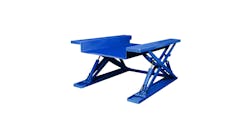new report new report co-authored by the Economic Policy Institute (EPI) and Stewart & Stewart, charges that \u0153 steelmakers around the globe, backed by aggressive government support, have targeted the large and open U.S. market to offload excess supply. The resulting surge of unfairly dumped and subsidized imports poses a serious threat to domestic steel producers and the half million jobs they support. \u009d\r\n\r\n American steelmakers and workers can compete with anyone in the world with a level playing field, \u009d said U.S. Senator Sherrod Brown (D-OH). But American producers are increasingly losing sales to foreign competitors like Korea because OCTG imports are being dumped into the U.S. market. Full enforcement of our trade laws is critical for the future of this industry and its workers. \u009d\r\nTaking the example of oil country tubular goods (OCTG) to point out the need for strong trade enforcement, the report observes that the import of these products from nine countries, chief among them South Korea, more than doubled between 2010 and 2012. As the surge continued, domestic steelmakers \u2122 production, capacity utilization, shipments, and sales all fell in the first quarter of 2013, and they slashed operating income by nearly $191 million. The more than 7,000 U.S. OCTG workers worked more hours but saw their combined wages fall.\r\n\r\nThe harm to domestic steel producers in the OCTG market sparked a petition for trade remedy relief in July of 2013, one of 38 individual petitions filed by steel producers and workers that year. However, the report said that the Department of Commerce \u2122s preliminary analysis gave South Korea a free pass on its dumping and a final determination from Commerce is due on July 8th. \r\n\r\n\u201cSouth Korea has no home market for OCTG and sends nearly all of its product to the United States consistently below fair market value,\u201d said Scott Paul, President of the Alliance for American Manufacturing (AAM). Congress doesn\u2018t act, we\u2018ll head down a path of swapping our dependence on foreign oil with a dependence on foreign energy infrastructure. \u009d\r\n\r\nLooking at the overall market, domestic steel imports increased by 12.8% from 2011 to 2013, and surged even more sharply in the first two months of 2014, hitting 6.4 million net tons, an increase of 24.5% over the same period in 2013. The loss of market share has translated into depressed domestic steel production and revenues, leading to sharp declines in net income in the U.S. steel industry over the past two years, as well as layoffs for thousands of American workers, the report concludes. \r\n\r\n\u201cThe surge of unfairly traded steel products into the United States has undercut American manufacturing and made the country a dumping ground for foreign competitors,\u201d \u009dsaid Brent Sansing, plant manager, U. S. Steel's Lone Star Tubular Operations in Lone Star, Texas. United States Steel Corporation is the largest fully-integrated tubular products producer in the United States, offering a broad range of oil country tubular products for the American energy industry. Our nation's opportunity to become a more energy independent country while growing good paying jobs and invigorating our economy is being threatened by these unfair trade practices. We need decision makers in Washington to take action, enforce our trade laws and support American manufacturing.\"\r\n\r\nThe report documents that all 583,600 steel-related jobs are at risk if the U.S. does not effectively enforce its established trade remedy laws, which have historically been vital to the steel industry \u2122s health. Already, an estimated 4,184 workers in eight states have lost their jobs to the import surge since the beginning of 2012 and resulting shifts in production. Nearly 1,000 steel jobs have been lost in the first three months of 2014.\r\n\r\nThe report further notes that: The excess capacity plaguing the industry stems largely from state support for and direct government involvement in the steel industry in other countries. In 2011, half of the world\u2019s 46 top steel companies were state-owned, and they accounted for nearly 40% of global production. U.S. imports of unfairly traded products are increasing as countries such as China and others deceptively sell subsidized basic steel products to companies in third-party countries, who in turn finish these products, like pipes, for sale in the American market. Aggressive government support, coupled with the steel industry \u2122s capital-intensive nature, leads to the kind of import surges now threatening the American market. Strong trade remedies have been critical to the health of domestic industry during previous periods of trade distortions, and are necessary now if the industry is to avoid long-term damage. The report concludes that unless policymakers insist established trade rules remain strictly enforced, the consequences for domestic steelmakers and their workers will be dire.\r\n"}" data-sheets-userformat="{"2":15165,"3":{"1":0},"5":{"1":[{"1":2,"2":0,"5":{"1":2,"2":0}},{"1":0,"2":0,"3":1},{"1":1,"2":0,"4":1}]},"6":{"1":[{"1":2,"2":0,"5":{"1":2,"2":0}},{"1":0,"2":0,"3":1},{"1":1,"2":0,"4":1}]},"7":{"1":[{"1":2,"2":0,"5":{"1":2,"2":0}},{"1":0,"2":0,"3":1},{"1":1,"2":0,"4":1}]},"8":{"1":[{"1":2,"2":0,"5":{"1":2,"2":0}},{"1":0,"2":0,"3":1},{"1":1,"2":0,"4":1}]},"11":3,"12":0,"14":{"1":2,"2":0},"15":"Arial","16":10}">A new report co-authored by the Economic Policy Institute (EPI) and Stewart & Stewart, charges that steelmakers around the globe, backed by aggressive government support, have targeted the large and open U.S. market to offload excess supply. The resulting surge of unfairly dumped and subsidized imports poses a serious threat to domestic steel producers and the half million jobs they support.
American steelmakers and workers can compete with anyone in the world with a level playing field, said U.S. Senator Sherrod Brown (D-OH). But American producers are increasingly losing sales to foreign competitors like Korea because OCTG imports are being dumped into the U.S. market. Full enforcement of our trade laws is critical for the future of this industry and its workers.
Taking the example of oil country tubular goods (OCTG) to point out the need for strong trade enforcement, the report observes that the import of these products from nine countries, chief among them South Korea, more than doubled between 2010 and 2012. As the surge continued, domestic steelmakers ™ production, capacity utilization, shipments, and sales all fell in the first quarter of 2013, and they slashed operating income by nearly $191 million. The more than 7,000 U.S. OCTG workers worked more hours but saw their combined wages fall.
The harm to domestic steel producers in the OCTG market sparked a petition for trade remedy relief in July of 2013, one of 38 individual petitions filed by steel producers and workers that year. However, the report said that the Department of Commerce ™s preliminary analysis gave South Korea a free pass on its dumping and a final determination from Commerce is due on July 8th.
“South Korea has no home market for OCTG and sends nearly all of its product to the United States consistently below fair market value,” said Scott Paul, President of the Alliance for American Manufacturing (AAM). Congress doesn‘t act, we‘ll head down a path of swapping our dependence on foreign oil with a dependence on foreign energy infrastructure.
Looking at the overall market, domestic steel imports increased by 12.8% from 2011 to 2013, and surged even more sharply in the first two months of 2014, hitting 6.4 million net tons, an increase of 24.5% over the same period in 2013. The loss of market share has translated into depressed domestic steel production and revenues, leading to sharp declines in net income in the U.S. steel industry over the past two years, as well as layoffs for thousands of American workers, the report concludes.
“The surge of unfairly traded steel products into the United States has undercut American manufacturing and made the country a dumping ground for foreign competitors,” said Brent Sansing, plant manager, U. S. Steel's Lone Star Tubular Operations in Lone Star, Texas. United States Steel Corporation is the largest fully-integrated tubular products producer in the United States, offering a broad range of oil country tubular products for the American energy industry. Our nation's opportunity to become a more energy independent country while growing good paying jobs and invigorating our economy is being threatened by these unfair trade practices. We need decision makers in Washington to take action, enforce our trade laws and support American manufacturing."
The report documents that all 583,600 steel-related jobs are at risk if the U.S. does not effectively enforce its established trade remedy laws, which have historically been vital to the steel industry ™s health. Already, an estimated 4,184 workers in eight states have lost their jobs to the import surge since the beginning of 2012 and resulting shifts in production. Nearly 1,000 steel jobs have been lost in the first three months of 2014.
The report further notes that:
- new report new report co-authored by the Economic Policy Institute (EPI) and Stewart & Stewart, charges that \u0153 steelmakers around the globe, backed by aggressive government support, have targeted the large and open U.S. market to offload excess supply. The resulting surge of unfairly dumped and subsidized imports poses a serious threat to domestic steel producers and the half million jobs they support. \u009d\r\n\r\n American steelmakers and workers can compete with anyone in the world with a level playing field, \u009d said U.S. Senator Sherrod Brown (D-OH). But American producers are increasingly losing sales to foreign competitors like Korea because OCTG imports are being dumped into the U.S. market. Full enforcement of our trade laws is critical for the future of this industry and its workers. \u009d\r\nTaking the example of oil country tubular goods (OCTG) to point out the need for strong trade enforcement, the report observes that the import of these products from nine countries, chief among them South Korea, more than doubled between 2010 and 2012. As the surge continued, domestic steelmakers \u2122 production, capacity utilization, shipments, and sales all fell in the first quarter of 2013, and they slashed operating income by nearly $191 million. The more than 7,000 U.S. OCTG workers worked more hours but saw their combined wages fall.\r\n\r\nThe harm to domestic steel producers in the OCTG market sparked a petition for trade remedy relief in July of 2013, one of 38 individual petitions filed by steel producers and workers that year. However, the report said that the Department of Commerce \u2122s preliminary analysis gave South Korea a free pass on its dumping and a final determination from Commerce is due on July 8th. \r\n\r\n\u201cSouth Korea has no home market for OCTG and sends nearly all of its product to the United States consistently below fair market value,\u201d said Scott Paul, President of the Alliance for American Manufacturing (AAM). Congress doesn\u2018t act, we\u2018ll head down a path of swapping our dependence on foreign oil with a dependence on foreign energy infrastructure. \u009d\r\n\r\nLooking at the overall market, domestic steel imports increased by 12.8% from 2011 to 2013, and surged even more sharply in the first two months of 2014, hitting 6.4 million net tons, an increase of 24.5% over the same period in 2013. The loss of market share has translated into depressed domestic steel production and revenues, leading to sharp declines in net income in the U.S. steel industry over the past two years, as well as layoffs for thousands of American workers, the report concludes. \r\n\r\n\u201cThe surge of unfairly traded steel products into the United States has undercut American manufacturing and made the country a dumping ground for foreign competitors,\u201d \u009dsaid Brent Sansing, plant manager, U. S. Steel's Lone Star Tubular Operations in Lone Star, Texas. United States Steel Corporation is the largest fully-integrated tubular products producer in the United States, offering a broad range of oil country tubular products for the American energy industry. Our nation's opportunity to become a more energy independent country while growing good paying jobs and invigorating our economy is being threatened by these unfair trade practices. We need decision makers in Washington to take action, enforce our trade laws and support American manufacturing.\"\r\n\r\nThe report documents that all 583,600 steel-related jobs are at risk if the U.S. does not effectively enforce its established trade remedy laws, which have historically been vital to the steel industry \u2122s health. Already, an estimated 4,184 workers in eight states have lost their jobs to the import surge since the beginning of 2012 and resulting shifts in production. Nearly 1,000 steel jobs have been lost in the first three months of 2014.\r\n\r\nThe report further notes that: The excess capacity plaguing the industry stems largely from state support for and direct government involvement in the steel industry in other countries. In 2011, half of the world\u2019s 46 top steel companies were state-owned, and they accounted for nearly 40% of global production. U.S. imports of unfairly traded products are increasing as countries such as China and others deceptively sell subsidized basic steel products to companies in third-party countries, who in turn finish these products, like pipes, for sale in the American market. Aggressive government support, coupled with the steel industry \u2122s capital-intensive nature, leads to the kind of import surges now threatening the American market. Strong trade remedies have been critical to the health of domestic industry during previous periods of trade distortions, and are necessary now if the industry is to avoid long-term damage. The report concludes that unless policymakers insist established trade rules remain strictly enforced, the consequences for domestic steelmakers and their workers will be dire.\r\n"}" data-sheets-userformat="{"2":15165,"3":{"1":0},"5":{"1":[{"1":2,"2":0,"5":{"1":2,"2":0}},{"1":0,"2":0,"3":1},{"1":1,"2":0,"4":1}]},"6":{"1":[{"1":2,"2":0,"5":{"1":2,"2":0}},{"1":0,"2":0,"3":1},{"1":1,"2":0,"4":1}]},"7":{"1":[{"1":2,"2":0,"5":{"1":2,"2":0}},{"1":0,"2":0,"3":1},{"1":1,"2":0,"4":1}]},"8":{"1":[{"1":2,"2":0,"5":{"1":2,"2":0}},{"1":0,"2":0,"3":1},{"1":1,"2":0,"4":1}]},"11":3,"12":0,"14":{"1":2,"2":0},"15":"Arial","16":10}"> The excess capacity plaguing the industry stems largely from state support for and direct government involvement in the steel industry in other countries. In 2011, half of the world’s 46 top steel companies were state-owned, and they accounted for nearly 40% of global production.
- new report new report co-authored by the Economic Policy Institute (EPI) and Stewart & Stewart, charges that \u0153 steelmakers around the globe, backed by aggressive government support, have targeted the large and open U.S. market to offload excess supply. The resulting surge of unfairly dumped and subsidized imports poses a serious threat to domestic steel producers and the half million jobs they support. \u009d\r\n\r\n American steelmakers and workers can compete with anyone in the world with a level playing field, \u009d said U.S. Senator Sherrod Brown (D-OH). But American producers are increasingly losing sales to foreign competitors like Korea because OCTG imports are being dumped into the U.S. market. Full enforcement of our trade laws is critical for the future of this industry and its workers. \u009d\r\nTaking the example of oil country tubular goods (OCTG) to point out the need for strong trade enforcement, the report observes that the import of these products from nine countries, chief among them South Korea, more than doubled between 2010 and 2012. As the surge continued, domestic steelmakers \u2122 production, capacity utilization, shipments, and sales all fell in the first quarter of 2013, and they slashed operating income by nearly $191 million. The more than 7,000 U.S. OCTG workers worked more hours but saw their combined wages fall.\r\n\r\nThe harm to domestic steel producers in the OCTG market sparked a petition for trade remedy relief in July of 2013, one of 38 individual petitions filed by steel producers and workers that year. However, the report said that the Department of Commerce \u2122s preliminary analysis gave South Korea a free pass on its dumping and a final determination from Commerce is due on July 8th. \r\n\r\n\u201cSouth Korea has no home market for OCTG and sends nearly all of its product to the United States consistently below fair market value,\u201d said Scott Paul, President of the Alliance for American Manufacturing (AAM). Congress doesn\u2018t act, we\u2018ll head down a path of swapping our dependence on foreign oil with a dependence on foreign energy infrastructure. \u009d\r\n\r\nLooking at the overall market, domestic steel imports increased by 12.8% from 2011 to 2013, and surged even more sharply in the first two months of 2014, hitting 6.4 million net tons, an increase of 24.5% over the same period in 2013. The loss of market share has translated into depressed domestic steel production and revenues, leading to sharp declines in net income in the U.S. steel industry over the past two years, as well as layoffs for thousands of American workers, the report concludes. \r\n\r\n\u201cThe surge of unfairly traded steel products into the United States has undercut American manufacturing and made the country a dumping ground for foreign competitors,\u201d \u009dsaid Brent Sansing, plant manager, U. S. Steel's Lone Star Tubular Operations in Lone Star, Texas. United States Steel Corporation is the largest fully-integrated tubular products producer in the United States, offering a broad range of oil country tubular products for the American energy industry. Our nation's opportunity to become a more energy independent country while growing good paying jobs and invigorating our economy is being threatened by these unfair trade practices. We need decision makers in Washington to take action, enforce our trade laws and support American manufacturing.\"\r\n\r\nThe report documents that all 583,600 steel-related jobs are at risk if the U.S. does not effectively enforce its established trade remedy laws, which have historically been vital to the steel industry \u2122s health. Already, an estimated 4,184 workers in eight states have lost their jobs to the import surge since the beginning of 2012 and resulting shifts in production. Nearly 1,000 steel jobs have been lost in the first three months of 2014.\r\n\r\nThe report further notes that: The excess capacity plaguing the industry stems largely from state support for and direct government involvement in the steel industry in other countries. In 2011, half of the world\u2019s 46 top steel companies were state-owned, and they accounted for nearly 40% of global production. U.S. imports of unfairly traded products are increasing as countries such as China and others deceptively sell subsidized basic steel products to companies in third-party countries, who in turn finish these products, like pipes, for sale in the American market. Aggressive government support, coupled with the steel industry \u2122s capital-intensive nature, leads to the kind of import surges now threatening the American market. Strong trade remedies have been critical to the health of domestic industry during previous periods of trade distortions, and are necessary now if the industry is to avoid long-term damage. The report concludes that unless policymakers insist established trade rules remain strictly enforced, the consequences for domestic steelmakers and their workers will be dire.\r\n"}" data-sheets-userformat="{"2":15165,"3":{"1":0},"5":{"1":[{"1":2,"2":0,"5":{"1":2,"2":0}},{"1":0,"2":0,"3":1},{"1":1,"2":0,"4":1}]},"6":{"1":[{"1":2,"2":0,"5":{"1":2,"2":0}},{"1":0,"2":0,"3":1},{"1":1,"2":0,"4":1}]},"7":{"1":[{"1":2,"2":0,"5":{"1":2,"2":0}},{"1":0,"2":0,"3":1},{"1":1,"2":0,"4":1}]},"8":{"1":[{"1":2,"2":0,"5":{"1":2,"2":0}},{"1":0,"2":0,"3":1},{"1":1,"2":0,"4":1}]},"11":3,"12":0,"14":{"1":2,"2":0},"15":"Arial","16":10}">U.S. imports of unfairly traded products are increasing as countries such as China and others deceptively sell subsidized basic steel products to companies in third-party countries, who in turn finish these products, like pipes, for sale in the American market.
- new report new report co-authored by the Economic Policy Institute (EPI) and Stewart & Stewart, charges that \u0153 steelmakers around the globe, backed by aggressive government support, have targeted the large and open U.S. market to offload excess supply. The resulting surge of unfairly dumped and subsidized imports poses a serious threat to domestic steel producers and the half million jobs they support. \u009d\r\n\r\n American steelmakers and workers can compete with anyone in the world with a level playing field, \u009d said U.S. Senator Sherrod Brown (D-OH). But American producers are increasingly losing sales to foreign competitors like Korea because OCTG imports are being dumped into the U.S. market. Full enforcement of our trade laws is critical for the future of this industry and its workers. \u009d\r\nTaking the example of oil country tubular goods (OCTG) to point out the need for strong trade enforcement, the report observes that the import of these products from nine countries, chief among them South Korea, more than doubled between 2010 and 2012. As the surge continued, domestic steelmakers \u2122 production, capacity utilization, shipments, and sales all fell in the first quarter of 2013, and they slashed operating income by nearly $191 million. The more than 7,000 U.S. OCTG workers worked more hours but saw their combined wages fall.\r\n\r\nThe harm to domestic steel producers in the OCTG market sparked a petition for trade remedy relief in July of 2013, one of 38 individual petitions filed by steel producers and workers that year. However, the report said that the Department of Commerce \u2122s preliminary analysis gave South Korea a free pass on its dumping and a final determination from Commerce is due on July 8th. \r\n\r\n\u201cSouth Korea has no home market for OCTG and sends nearly all of its product to the United States consistently below fair market value,\u201d said Scott Paul, President of the Alliance for American Manufacturing (AAM). Congress doesn\u2018t act, we\u2018ll head down a path of swapping our dependence on foreign oil with a dependence on foreign energy infrastructure. \u009d\r\n\r\nLooking at the overall market, domestic steel imports increased by 12.8% from 2011 to 2013, and surged even more sharply in the first two months of 2014, hitting 6.4 million net tons, an increase of 24.5% over the same period in 2013. The loss of market share has translated into depressed domestic steel production and revenues, leading to sharp declines in net income in the U.S. steel industry over the past two years, as well as layoffs for thousands of American workers, the report concludes. \r\n\r\n\u201cThe surge of unfairly traded steel products into the United States has undercut American manufacturing and made the country a dumping ground for foreign competitors,\u201d \u009dsaid Brent Sansing, plant manager, U. S. Steel's Lone Star Tubular Operations in Lone Star, Texas. United States Steel Corporation is the largest fully-integrated tubular products producer in the United States, offering a broad range of oil country tubular products for the American energy industry. Our nation's opportunity to become a more energy independent country while growing good paying jobs and invigorating our economy is being threatened by these unfair trade practices. We need decision makers in Washington to take action, enforce our trade laws and support American manufacturing.\"\r\n\r\nThe report documents that all 583,600 steel-related jobs are at risk if the U.S. does not effectively enforce its established trade remedy laws, which have historically been vital to the steel industry \u2122s health. Already, an estimated 4,184 workers in eight states have lost their jobs to the import surge since the beginning of 2012 and resulting shifts in production. Nearly 1,000 steel jobs have been lost in the first three months of 2014.\r\n\r\nThe report further notes that: The excess capacity plaguing the industry stems largely from state support for and direct government involvement in the steel industry in other countries. In 2011, half of the world\u2019s 46 top steel companies were state-owned, and they accounted for nearly 40% of global production. U.S. imports of unfairly traded products are increasing as countries such as China and others deceptively sell subsidized basic steel products to companies in third-party countries, who in turn finish these products, like pipes, for sale in the American market. Aggressive government support, coupled with the steel industry \u2122s capital-intensive nature, leads to the kind of import surges now threatening the American market. Strong trade remedies have been critical to the health of domestic industry during previous periods of trade distortions, and are necessary now if the industry is to avoid long-term damage. The report concludes that unless policymakers insist established trade rules remain strictly enforced, the consequences for domestic steelmakers and their workers will be dire.\r\n"}" data-sheets-userformat="{"2":15165,"3":{"1":0},"5":{"1":[{"1":2,"2":0,"5":{"1":2,"2":0}},{"1":0,"2":0,"3":1},{"1":1,"2":0,"4":1}]},"6":{"1":[{"1":2,"2":0,"5":{"1":2,"2":0}},{"1":0,"2":0,"3":1},{"1":1,"2":0,"4":1}]},"7":{"1":[{"1":2,"2":0,"5":{"1":2,"2":0}},{"1":0,"2":0,"3":1},{"1":1,"2":0,"4":1}]},"8":{"1":[{"1":2,"2":0,"5":{"1":2,"2":0}},{"1":0,"2":0,"3":1},{"1":1,"2":0,"4":1}]},"11":3,"12":0,"14":{"1":2,"2":0},"15":"Arial","16":10}"> Aggressive government support, coupled with the steel industry's capital-intensive nature, leads to the kind of import surges now threatening the American market. Strong trade remedies have been critical to the health of domestic industry during previous periods of trade distortions, and are necessary now if the industry is to avoid long-term damage.
new report new report co-authored by the Economic Policy Institute (EPI) and Stewart & Stewart, charges that \u0153 steelmakers around the globe, backed by aggressive government support, have targeted the large and open U.S. market to offload excess supply. The resulting surge of unfairly dumped and subsidized imports poses a serious threat to domestic steel producers and the half million jobs they support. \u009d\r\n\r\n American steelmakers and workers can compete with anyone in the world with a level playing field, \u009d said U.S. Senator Sherrod Brown (D-OH). But American producers are increasingly losing sales to foreign competitors like Korea because OCTG imports are being dumped into the U.S. market. Full enforcement of our trade laws is critical for the future of this industry and its workers. \u009d\r\nTaking the example of oil country tubular goods (OCTG) to point out the need for strong trade enforcement, the report observes that the import of these products from nine countries, chief among them South Korea, more than doubled between 2010 and 2012. As the surge continued, domestic steelmakers \u2122 production, capacity utilization, shipments, and sales all fell in the first quarter of 2013, and they slashed operating income by nearly $191 million. The more than 7,000 U.S. OCTG workers worked more hours but saw their combined wages fall.\r\n\r\nThe harm to domestic steel producers in the OCTG market sparked a petition for trade remedy relief in July of 2013, one of 38 individual petitions filed by steel producers and workers that year. However, the report said that the Department of Commerce \u2122s preliminary analysis gave South Korea a free pass on its dumping and a final determination from Commerce is due on July 8th. \r\n\r\n\u201cSouth Korea has no home market for OCTG and sends nearly all of its product to the United States consistently below fair market value,\u201d said Scott Paul, President of the Alliance for American Manufacturing (AAM). Congress doesn\u2018t act, we\u2018ll head down a path of swapping our dependence on foreign oil with a dependence on foreign energy infrastructure. \u009d\r\n\r\nLooking at the overall market, domestic steel imports increased by 12.8% from 2011 to 2013, and surged even more sharply in the first two months of 2014, hitting 6.4 million net tons, an increase of 24.5% over the same period in 2013. The loss of market share has translated into depressed domestic steel production and revenues, leading to sharp declines in net income in the U.S. steel industry over the past two years, as well as layoffs for thousands of American workers, the report concludes. \r\n\r\n\u201cThe surge of unfairly traded steel products into the United States has undercut American manufacturing and made the country a dumping ground for foreign competitors,\u201d \u009dsaid Brent Sansing, plant manager, U. S. Steel's Lone Star Tubular Operations in Lone Star, Texas. United States Steel Corporation is the largest fully-integrated tubular products producer in the United States, offering a broad range of oil country tubular products for the American energy industry. Our nation's opportunity to become a more energy independent country while growing good paying jobs and invigorating our economy is being threatened by these unfair trade practices. We need decision makers in Washington to take action, enforce our trade laws and support American manufacturing.\"\r\n\r\nThe report documents that all 583,600 steel-related jobs are at risk if the U.S. does not effectively enforce its established trade remedy laws, which have historically been vital to the steel industry \u2122s health. Already, an estimated 4,184 workers in eight states have lost their jobs to the import surge since the beginning of 2012 and resulting shifts in production. Nearly 1,000 steel jobs have been lost in the first three months of 2014.\r\n\r\nThe report further notes that: The excess capacity plaguing the industry stems largely from state support for and direct government involvement in the steel industry in other countries. In 2011, half of the world\u2019s 46 top steel companies were state-owned, and they accounted for nearly 40% of global production. U.S. imports of unfairly traded products are increasing as countries such as China and others deceptively sell subsidized basic steel products to companies in third-party countries, who in turn finish these products, like pipes, for sale in the American market. Aggressive government support, coupled with the steel industry \u2122s capital-intensive nature, leads to the kind of import surges now threatening the American market. Strong trade remedies have been critical to the health of domestic industry during previous periods of trade distortions, and are necessary now if the industry is to avoid long-term damage. The report concludes that unless policymakers insist established trade rules remain strictly enforced, the consequences for domestic steelmakers and their workers will be dire.\r\n"}" data-sheets-userformat="{"2":15165,"3":{"1":0},"5":{"1":[{"1":2,"2":0,"5":{"1":2,"2":0}},{"1":0,"2":0,"3":1},{"1":1,"2":0,"4":1}]},"6":{"1":[{"1":2,"2":0,"5":{"1":2,"2":0}},{"1":0,"2":0,"3":1},{"1":1,"2":0,"4":1}]},"7":{"1":[{"1":2,"2":0,"5":{"1":2,"2":0}},{"1":0,"2":0,"3":1},{"1":1,"2":0,"4":1}]},"8":{"1":[{"1":2,"2":0,"5":{"1":2,"2":0}},{"1":0,"2":0,"3":1},{"1":1,"2":0,"4":1}]},"11":3,"12":0,"14":{"1":2,"2":0},"15":"Arial","16":10}">The report concludes that unless policymakers insist established trade rules remain strictly enforced, the consequences for domestic steelmakers and their workers will be dire.










